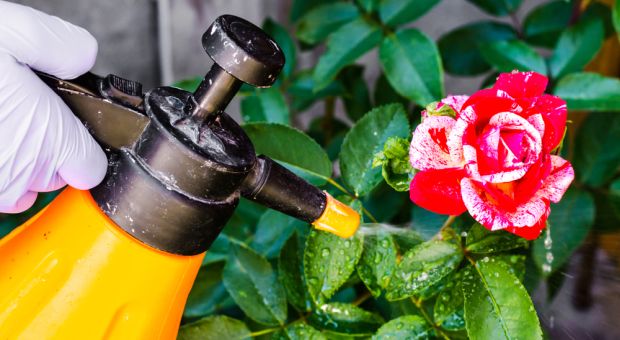When you’ve got a traditional garden, you can knock up a fence and keep many of the larger pests away.
But, that fence will show everyone who wanders by that you’ve got something worth protecting. If you’re trying to hide a survival garden in the wild, you don’t need any infrastructure calling attention to it.
So, how do you keep the pests and critters out of your wilderness survival garden? Without a fence, it’s a bit harder. But, with careful planning, care, and a bit of hard work it is definitely possible. Here are ten ideas to help you keep your crops safely growing.
Spread Out Your Plants
To keep your wilderness garden safe, you must throw out the “traditional” gardening rules. This includes the use of traditional spacing and planting in rows.
Instead of planting all your tomatoes in one section of your garden, spread them out a bit. Plant a couple in one area and some more several yards away (or even further depending on how much space you have available.)
Find NOW The 3 Most Powerful Remedies That We Lost to History
This helps give your survival garden a bit of extra protection. It makes the pests work harder to attack your entire crop of anything. They’ll have to exert energy trying to find your other locations, which they’re less likely to do if they’ve already found some.
Keep Debris Away
Dead plants, broken tree limbs, and other debris provide hiding places for insects of all variety. Throughout the growing season, keep your garden areas clean of debris to discourage any pests from moving in.
Take time to pick up fallen fruit, so your garden doesn’t look like an all-you-can-eat buffet. You might consider dumping these items away from your garden, to attract pests to a different area. However, feeding wildlife can have unintended consequences, so carefully think through this before trying.
Check the health of your plants. Look for diseased plants and quickly treat them or remove them.
Also, remember to take care of your weeds. Once you pull them, don’t just leave them on the ground to rot. Instead, remove them completely from the area.
Use Natural Barriers
As you plan your survival garden, look for areas with natural barriers. You want areas where you can limit access to larger pests and human intruders. This will also help keep your garden hidden.
Do you have a large patch of stinging nettles growing on your property? Use it to your advantage and plant on the other side. You’ll have to wear gloves and long pants when you check on this part of your garden, but it’ll be protected.
Are there any uneven areas around you? Use your terrain to your advantage. Many animals avoid walking through rough or steep areas if there is a different route available. Just make sure that where ever you plant is accessible to you throughout the growing season. Otherwise you won’t be able to harvest your plants.
You can also plant a hedgerow to act as a natural barrier, but this will take a couple of years to fill in. Consider starting this now, so anyone walking or driving becomes familiar with it and doesn’t think anything of it when the times get tough.
Prickly or thorny plants are another alternative to the traditional bushy hedgerow. You want to discourage anyone or anything from getting close enough to discover you’re growing food.
Create Your Own, Natural Pesticide
When the SHTF, you won’t be able to run to the store to grab a bottle of pesticide. With all their nasty chemical, you don’t want to spray them on your food anyways!
Instead, take time now to experiment with natural pesticides. That way you can find one that works well for the pests you are dealing with. Ideally, you’ll create one that uses ingredients you plan on stocking up on. That way you’ll be able to mix up more when you need it.
Baking soda is a common ingredient in natural pesticides. You can mix it with dish soap, olive oil, and water to create a sprayable deterrent to pests.
You can also use a covered jar to mix a cup of vegetable oil with a tablespoon of soap. When it’s time to spray your plants, add two teaspoons of this mixture to a quart of water in a spray bottle. Shake it well to ensure it blends before use.
Plant Strong Smelling Plants
Many pests don’t like the smell of strong-smelling plants or herbs. If you integrate these plants into your garden plans, you can help protect your crops.
Of course, these plants can act as a signal to humans looking for food. So, you’ll want to be strategic. Don’t plant tons of marigolds and lavender around every single garden plot.
Instead, plant these deterrents more strategically. Consider adding a couple of other flowers as well, to help everything blend in. Or plant a couple right next to the plants you’re having the most trouble with.
Rotate the plants you use, to help add diversity to your garden. Here are ten plants with strong-smells that can help reduce pests. These options are edible, and some have medicinal benefits.
- Marigolds
- Lavender
- Tansy
- Peppermint
- Oregano
- Garlic
- Onions
- Chives
- Dill
- Cayenne pepper
Take Care Of Your Soil
Healthy gardens have more resistance to pests. To increase the health of your garden, focus on your soil.
Take time to compost and add a generous amount to your soil at least once during each season. But, be careful not to just dump your kitchen scraps on your garden so it can compost naturally out there. The waste will attract too many pests to make it beneficial.
Learn about your soil. Find out if it’s acidic or not. Do everything you can to improve it now. That way it’s ready to go when the SHTF, so you won’t have to waste any time worrying about not having fertile soil.
Learn What Pests You’re Dealing With
If you keep losing plants, you must take time to learn why. Without this knowledge, you might be putting your effort into the wrong direction.
Walk through your garden randomly throughout the day and try to catch a glimpse of any larger critters. Look for tracks, scat, or any other signs that’ll help you figure out what’s eating your plants.
If you are dealing with bugs, try to find one. Look for eggs, bite marks, or anything else that will give you a clue to discover the identity of your pests.
Once you know what you’re dealing with, you can fight back. Here are five examples:
- If racoons are destroying your plants, sprinkle some Epsom salt around the perimeter.
- You can use bird netting to protect your tree crops from birds.
- Deer don’t like milk. You can spray plants with a mixture of milk and soap to help keep them away.
- You can use soapy water to help keep aphid populations down.
- Grow peppermint to keep ants (and some other pests) away.
There are natural solutions for all pests. But, not all solutions work for all pests. So, save yourself time and energy and learn what you’re dealing with.
Diversify Your Garden
Having a healthy ecosystem will help keep your wilderness garden balanced. Plant a variety of plants instead of devoting a ton of space to any one crop.
Mix your perennials and your annuals instead of separating them. The more variety you have, the greater your chances of having produce to harvest at the end of the season.
Some plants encourage beneficial insects to move into your garden. You can use these plants to your advantage to help you reduce the levels of problematic bugs.
To add variety and make your garden attractive to these beneficial insects, consider mixing the following plants into your garden:
- Alyssum
- Sunflowers
- Fennel
- Parsley
- Chamomile
Plant Native Plants and Edible Weeds
What grows well in the wild around you? You can let these plants guide you into creating a strong garden.
What many people consider weeds can be used to feed your family. Often, these plants are safer from pests because there’s an abundance of them.
Go on a hike and keep your eyes peeled for wild edibles. This will help you get a better idea of what plants do well in your area.
Depending on where you live, you might consider dedicated some of your wild garden to the following:
- Dandelions
- Clover
- Lamb’s Quarter
- Plantain
- Chicory
- Purslane
As an added bonus, flowering weeds can help attract beneficial bugs such as bees, to help keep your garden growing strong.
Rotate Your Annuals
Make a plan for rotating your annuals. By planting a completely distinct species in the area during the next growing season, you’ll help reduce your pest levels.
If pests that love a certain host have moved into a particular area, you can minimize their population planting something completely different.
This practice will also keep diseases away and help put more nutrients into your soil.
It’s important to keep growing records each year. This way when the SHTF, you don’t have to try and remember exactly what you planted before. You can just look at your records and know.
Your Garden Is Your Lifeline
Without grocery stores, your survival will depend on your ability to gather and produce your own food. You can’t let pests overrun your garden, because you need that food for your family. You must do what it takes to keep the pests away.






















































































Beware of planting fennel in your vegetable garden. Unlike other companion plants, it is combative to many common vegetables such as tomatoes. . Plant it separately from other plants. Plant it near your dog kennel to repel fleas.
Thank you for your tips, S Andrews.
Alex, from Survivopedia 🙂
One of the easiest ways to keep insects under control is by planting blooming cover crops, mustard, buckwheat, sunn hemp, physalia, are some good plants to try. They bring in pollinators and predator insects to keep the problem pests at bay. The will reseed readily but not too aggressively so you don’t need to replant each year. Just pull out any that are in places where you don’t want them. Use deep mulch to keep weeds under control and encourage decomposer insects in the soil. If you do this you will rarely have pests, usually have high fruit set on your squash, cucumbers etc, the soil will be fertile and retain moisture. Mulch and cover crops will solve most of the common garden problems.
Thank you for sharing such valuable information with us, Phyl.
Alex, from Survivopedia 🙂
I tried this years ago on my roses that were just covered in aphids. A mixture of 1/2 water and 1/2 whole milk sprayed on the under parts of the leaves and along the stems will kill aphids and keep them away for a while. I even poured the unused portion of the mixture around the base of the plants to maybe deter them from coming back for more. I got that remedy from a gardening book quite a few years ago.